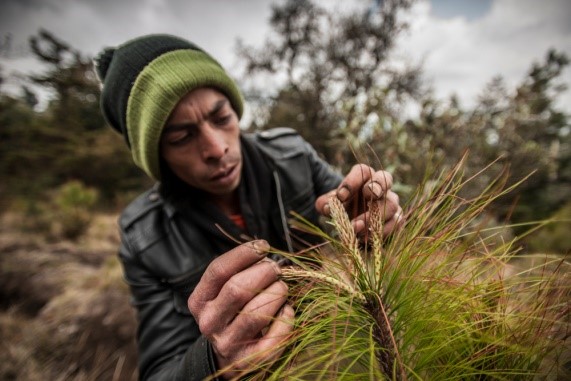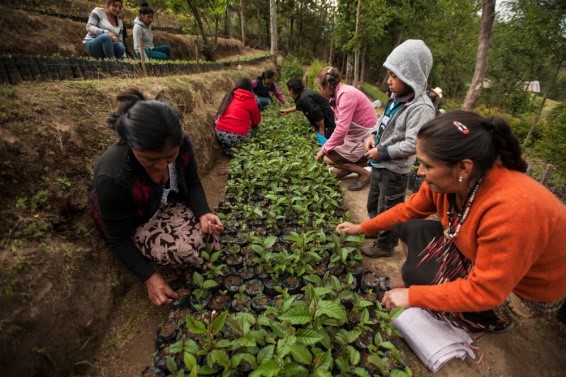"Action learning" and monitoring to increase capacities and knowledge
Delfino Roblero, youth representative, forest monitoring for pests and disease. Esquichá Microbasin (Coatán Basin)
IUCN @ Paul Aragón
Sanajabá community forestry nursery, Esquichá Microbasin (Coatán Basin)
IUCN @ Paul Aragón
There is a continuous process of capacity building with local communities and institutions to identify, design and implement ecosystem-based adaptation (EBA) measures, generating evidence on their benefits, and creating conditions for their sustainability.
The process includes not only theoretical workshops but also: technical assistance, field practices, exchange tours and a diploma for municipal technicians. The process is collaborative and participatory, and the experience was of great learning and empowerment for the groups involved, especially women.
Some examples of activities include:
- Application of the CRiSTAL tool - "Community-based Risk Screening Tool - Adaptation and Livelihoods" with municipal and community representatives
- Along with 16 communities and the Municipality of Tacaná, the forest restoration strategy was designed and implemented, supporting community nurseries
- Communities are accompanied in the management of forest incentives for sanitation, reforestation and protection actions.
- Local leaders are trained in methodologies to monitor the effects of forest restoration and protection of water sources on food and water security.
- The Municipal Council of Tacaná provided accompaniment to the communities in the process of access to forest incentives.
- IUCN had 10 years of experience in the territory and local technical staff.
- There is excellent community leadership, which increases their willingness to dialogue, learning and the search for solutions.
- There is an awareness of climate change, since extreme events in previous years have impacted several communities, damaging both their assets (crops, housing, productive infrastructure) and the water resource.
- Having knowledge on water security and specific technical information on EbA facilitated the processes of awareness raising, participation, adoption of community agreements and implementing targeted actions, which in turn helped to avoid the dispersion of resources.
- Since there is an organizational base in the communities, in the form of Communal Forestry Nursery Commissions and in some cases Community Development Councils (COCODEs), the process of "learning by doing" is greatly facilitated since, through these local platforms, it is possible to promote the exchange of experiences and knowledge, and collective learning.
- Local empowerment through social participation is key to ensure the implementation and continuous improvement of a Monitoring and Evaluation system, as well as to obtain lessons learned. Communities are convened thought their leaders. This approach has greater chance to ensure sustainability in time and replicability of EbA measures.


